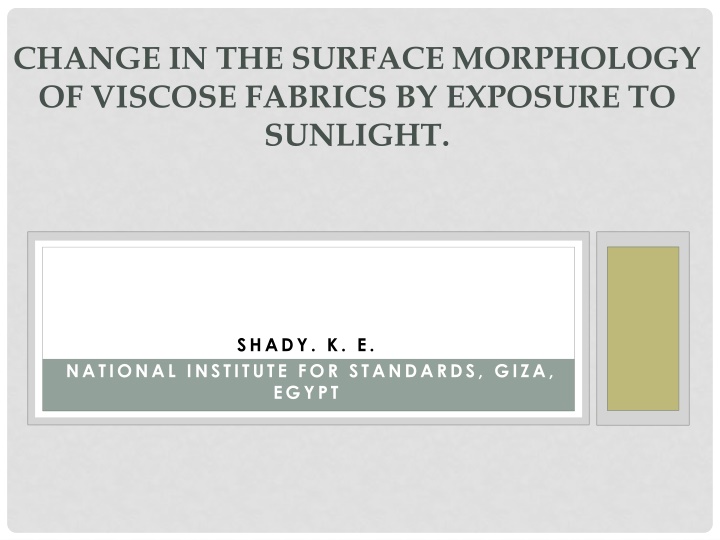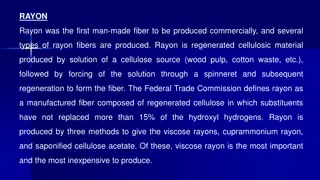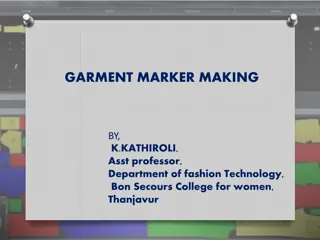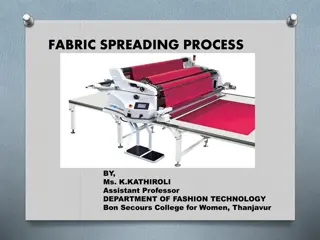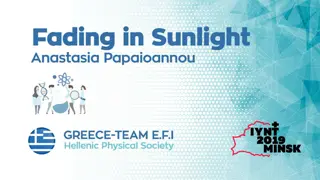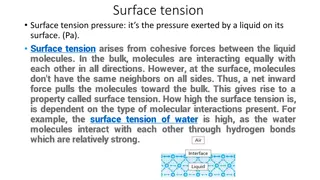Changes in Viscose Fabric Surface Morphology Due to Sunlight Exposure
This study explores the impact of sunlight exposure on the surface morphology of viscose fabrics. Direct exposure to sunlight for 120 days during summer showed significant changes in fiber surface depressions. The observed damage in mechanical properties correlated with alterations in surface morphology. Scanning electron microscopy (SEM) was utilized to delve into the structural changes in detail, shedding light on the degradation process caused by environmental factors like light, moisture, and temperature.
Download Presentation

Please find below an Image/Link to download the presentation.
The content on the website is provided AS IS for your information and personal use only. It may not be sold, licensed, or shared on other websites without obtaining consent from the author.If you encounter any issues during the download, it is possible that the publisher has removed the file from their server.
You are allowed to download the files provided on this website for personal or commercial use, subject to the condition that they are used lawfully. All files are the property of their respective owners.
The content on the website is provided AS IS for your information and personal use only. It may not be sold, licensed, or shared on other websites without obtaining consent from the author.
E N D
Presentation Transcript
CHANGE IN THE SURFACE MORPHOLOGY OF VISCOSE FABRICS BY EXPOSURE TO SUNLIGHT. SHADY. K. E. NATIONAL INSTITUTE FOR STANDARDS, GIZA, EGYPT
CHANGE IN THE SURFACE MORPHOLOGY OF VISCOSE FABRICS BY EXPOSURE TO SUNLIGHT. Abstract: the changes in the morphology of the fiber surface of viscose fabric after direct exposure to sunlight for 120 days during summer time. The figures obtained show that after exposure to sunlight a number of large depressions were formed on the fiber surfaces. The observed damage in the mechanical properties of the fabric can be directly related to the produced changes in the surface morphology. Scanning electron microscope (SEM) was used to study
CHANGE IN THE SURFACE MORPHOLOGY OF VISCOSE FABRICS BY EXPOSURE TO SUNLIGHT. Introduction: Exposure to sunlight causes modifications and breakdowns of the molecular structure of textile materials which in turn, results in the loss of strength, extensibility, general durability , and possibly appearance. Most researchers agree that light, particularly of near ultraviolet wave lengths (290-315 nm), moisture presence in liquid or vapor form, temperature, and oxygen are the most responsible factors in textile degradation [1-3,12]. The exposure causes a certain level of degradation which could be measured by the surface observation. Surface morphology of the fiber may be used as a measure of the extent of degradation as well as determination of the breaking strength.
CHANGE IN THE SURFACE MORPHOLOGY OF VISCOSE FABRICS BY EXPOSURE TO SUNLIGHT. The introduction of scanning electron microscopy (SEM) allows the possibility of studying the sequence of damage in details. It has many advantages [4], e.g. simplicity in sample preparation, direct examination of the surface and much greater depth of field, high resolution and magnification. Moreover, details of morphology of micro fiber [5], degradation[6], changes in surface morphology [5], oxidation, surface changes, surface abrasion [7-8], effect of radiation on surface morphology [9], and surface structure [10,11] may be briefly examined.
CHANGE IN THE SURFACE MORPHOLOGY OF VISCOSE FABRICS BY EXPOSURE TO SUNLIGHT. Experimental: Continuous unprotected outdoor exposure of viscose fabric samples were performed for 120 days in summer (May 1stto August 30th, 2000) at an urban site in Egypt. The samples were removed, conditioned in a room maintained at 23 oc and 65% relative humidity. They were tested for tensile strength and elongation percent using a C. R. T. apparatus. The specifications of the examined viscose samples are given in [Table (1)] together with the results of mechanical properties.
CHANGE IN THE SURFACE MORPHOLOGY OF VISCOSE FABRICS BY EXPOSURE TO SUNLIGHT. 135.3 Nominal wt,g/m2 Warp Weft Thread/cm 54 25 Linear density 13 16 Tensile Befor After exposure Los, % strength In exposure kg/F 59.2 8 86.5 Elongation, % 14.5 3 79.3 Table (1) The specifications of the viscose fiber and results of loss in Mechanical properties
CHANGE IN THE SURFACE MORPHOLOGY OF VISCOSE FABRICS BY EXPOSURE TO SUNLIGHT. The exposed samples were cleaned using ultrasonic equipment. They were then attached to metal stubs with an adhering substance and coated with a conducting layer, about 200 A thick, of gold in a vacuum coating apparatus. A 20 KV and 200 A resolution SEM was used. Magnification was in the range 20 x to 4000 x. (Fig.1) shows the SEM photos of viscose fiber after exposure for 120 days to sunlight.
CHANGE IN THE SURFACE MORPHOLOGY OF VISCOSE FABRICS BY EXPOSURE TO SUNLIGHT. 20 x 200 x 4000 x
CHANGE IN THE SURFACE MORPHOLOGY OF VISCOSE FABRICS BY EXPOSURE TO SUNLIGHT. Results and Discussion: When considering (Fig. 1) obtained by the SEM for viscose fiber surface, after direct exposure to sunlight at an urban site in Egypt for 120 days in summer, a serious damage can be clearly observed. Moreover, a number of large depressions can be seen on the fiber surfaces. This damage is attributed to the fact that the textile sample was subjected to severe environmental conditions of exposure which produced the changes of the surface morphology of the fibers.
CHANGE IN THE SURFACE MORPHOLOGY OF VISCOSE FABRICS BY EXPOSURE TO SUNLIGHT. Results and Discussion: In addition, the absorbed UV radiation which represents about 5% [1, 3, 12] of the total incident solar energy falling on the earth surface which gives more energy per photon than the visible or infrared radiation causes bond rupture, since the energies of photons in this near UV region correspond to, or exceed, the covalent bond energies of some chemical structures. This conclusion is also confirmed by the measuring results of the mechanical properties of the examined fabric (Table 1), where a considerable loss in both the tensile strength and elongation was observed. The losses in both parameters were 86.5 and 79.3% respectively, after exposure. In other words, the observed damage in mechanical properties of the fabric can be directly related to the produced changes in the surface morphology of the fibers.
CHANGE IN THE SURFACE MORPHOLOGY OF VISCOSE FABRICS BY EXPOSURE TO SUNLIGHT. REFFERECNES 1-Shady K. E., ph. D. thesis, Faculty of Applied Arts, Hellwan Univ. Cairo, (1989). 2-Shady K. E., Master D. thesis, Faculty of Applied Arts, Hellwan Univ. Cairo (1983). 3-Tera F. M. Guthrie J. T., Shady K. E., International polymeric Material, 9 (45), (1989). 4-Anderson, G. A., Katw, H. J., Lipson, M., wod, G. F.: Text. Res. J., 40, 29 (1990). 5-Shridhar, M. Betrahet, N., Rolling, J., Mary, L.: Text. Chem. Colour., 2012. 6-Ansell, M. P.: J. Text. Insti., 263 (1988). 7-Oweltz, N. E., Hearle, J. W. S., Cusick, G. E., Brend, L.: J. Text. Inst., 250 (198). 8-El-Gaiar, M., N., Cusick, G. E.: J. Text. Inst., 67, 141 (1996). 9-Yasuhara Fujiwara, Saiko Kobayashi: The Society of polymer Science, Japan, 33, No. 12 (1996). 10-Barakat, N., Khalifa, B. A., Fouda, I. M.: Egyptian J. phys., 10, No. 12 (2001). 11-Hearle, J. W. S., peters: "Fibre Structure", London (Text. Institute Manchester), secand add. (2012). 12-AATCC, Text. Chem Colour: 186-1999 (2008).
